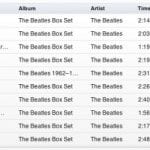is .99 cents for a song really too much to ask for?
Yeah…the title of this post is messed up. That should read 99 cents…nevertheless…here we go:
An old friend and former colleague of mine who spent a good part of his career working for a large Nashville-based entertainment firm is now earning a living as both an artist manager and a music marketing consultant. He also maintains a great website called The Music Gardener where he blogs frequently and offers great suggestions to artists on a variety of career development topics. And he also poses some interesting questions from time to time.
In the past couple of weeks he has been trying to tackle the question of what the cost of a song should be. In his first post asking “Is The Price Right” he laid out this argument:
“Here are a few things to think about. The price of a single song on iTunes today is .99 cents which just happens to be the same as it was for a cassette single twenty years ago. Twenty years ago a gallon of gas was $1.08, a dozen eggs were .89 cents, and movie tickets were $4.00. Last week my wife and I went to a movie and paid $12/ticket resulting in a $24 purchase for the two of us to be entertained for a couple of hours. On the way home, we purchased gas at $2.70/gallon and bought a dozen eggs for $2.50. This bodes the question “why is the price of music suppressed and not allowed to increase in value?” Do consumers think less of music than a pack of gum, a soda, or a loaf of bread? The answer is sadly a resounding and obvious yes. But why? Is there anything that can be done to change the perceived value of music in the consumer’s mind”
That brought him a lot of feedback that went along this line of thought:
“Many people still defend the argument that music should be cheaper now than it was 15-20 years ago based on the argument that it is cheaper to make and deliver digital music than it was for physical music in the past.”
And so that led him to posting the follow-up question of “Is .99 Cents Really Too Much to Ask?” And below I’ll excerpt pretty much the entire post for you:
“Let’s take the economics of one song and break it down. We are going to assume the ideal scenario for a song that is written, recorded and marketed quickly. Our assumption will be based on an eight hour day which is definitely the exception for creating, recording and marketing a great song.
– A song that takes very little time to write still probably takes the better part of a day (eight hours) What should the hourly rate for a song writer be?
– A song that requires little amount of time to record will usually take at least a day (eight hours) What should the hourly rate be for the studio full of recording gear even if it is in a garage or basement?
– What is the engineer’s time worth based on an eight hours of work?
– What is the producer’s time worth on an eight hours of work?
– Let’s assume you have a marketing person who is able to pull a marketing plan together and execute it in a day. What is eight hours of his time worth?
– You also have the designer who designs the record cover which is required even in the digital age. What is eight hours of his time worth?
– Someone has to upload the music and work with iTunes in order to get it positioned and pictured. What is this person’s time worth?
– A radio promoter spends hours of time calling hundreds of radio stations making them aware of the song and asking them to play it. This is impossible to do in a day but what do you think their hourly wage should be?
– The publicist spends hours of time calling and emailing hundreds of magazines, TV shows, internet sites to set up interviews and record reviews. What should their hourly rate be?
– Magazines, Facebook, MySpace, Twitter, Reverb Nation, and even Google require a nice photo in order to feature the artist. What do you think the photographer’s hourly rate should be?
– Someone has to collect the money and make sure the songwriter’s, artist and Uncle Sam are paid. What is this person’s time worth?
In conclusion, let’s look at the .99 cent price of a song. iTunes keeps .30 cents leaving .70 cents to cover everything listed above. If we take the twelve people listed above (and there are many we left out) and divide up the .70 cents, each person would get roughly 6 cents per song sold. There are no guarantees that a song will sell more than 1 copy and many don’t. At 100 copies sold, each of these people would make $6 total. Based on eight hours, that is .75 cents an hour. Minimum wage is $7-$8 depending on which state you live.
Is this really how we want to value music? Can we change the perception in consumers minds?”
As you can see, if you agree with his numbers and follow this line of thought, we should be seeing songs sold on iTunes for probably ten bucks each, and a full album would be maybe a hundred dollars or more. Of course we know that the price for a song is just .99 cents, and even at that incredible bargain…sales are flat and illegal file sharing and downloading continues for at least one or two generations.
How I see the answer to the question of value is simply what will the consumer pay for a song? The answer is not how much it costs, not what’s fair to the composer, artist or producer, nor how we got to this place. I think pretty much everyone (even the generation raised on technology and who are used to “free” as a price point) would agree that music is worth something.
But I’ll throw this out for thought: it’s not worth .99 a song.
Viewing value through the lens of how the music business has been rolling along all these years is a trap. That model was based on ownership, and technology is pretty close to wiping that concept out. As we rapidly move to a cloud-based environment that will encompass all forms of entertainment (film, tv, books, games, music and home pc software) consumers will be giving up ownership in exchange for access to everything at any time, on whatever preferred platform there is. And the subscription prices will be mind-boggling LOW…which will make today’s .99/song almost laughable.
My crystal ball shows two levels of artists: those (very few) that will stay and thrive within the major corporation environment enjoying extensive marketing campaigns, access to international media and concert venues. And everyone else.
The former will develop revenue streams built on selling tickets and merchandise. The latter….that’s the million dollar question nobody has come up with an answer for. Including me nor my old friend.
Feel free to share and maybe somebody will come up with the answer.




